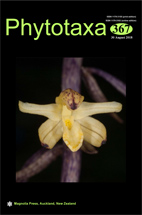Abstract
A new Echinostelium novozhilovii species from Northern Asia is described and illustrated. The species was collected in the Khanty-Mansiysk Autonomous Okrug-Yugra, Russia. This new species clearly differs from the previously known species by several morphological characters. Its sporocarps have very large dimensions of 700–2500 µm tall, which exceed the dimensions of E. minutum (up to 500 µm tall). Its spores are the biggest among all known species of the Echinostelium genus with 20–25(30) µm in diameter. Its columella consists of several spore-like bodies. We present a scanning electron micrograph study of E. novozhilovii and an updated identification key for species of the Echinostelium genus worldwide, which currently includes 15 taxa. Holotype specimen of E. novozhilovii is deposited in NSK. It is the first new species for the Echinostelium genus since 1997.
References
<p class="Reference">Adamonyte, G. (2006) The genus <em>Echinostelium</em> (Myxomycetes) in Lithuania. <em>Acta Mycologica</em> 41 (2): 169–176.</p><p class="Reference"> https://doi.org/10.5586/am.2006.020</p><p class="Reference">Alexopoulos, M. (1958) Three new species of Myxomycetes from Greece. <em>Mycologia</em> 50 (1): 52.</p><p class="Reference"> https://doi.org/10.2307/3756035</p><p class="Reference">Fiore-Donno, A.M., Berney, C., Pawlowski, J. & Baldauf, S.L. (2005) Higher-order phylogeny of plasmodial slime molds (Myxogastria) based on elongation factor 1-A and small subunit rRNA gene sequences. <em>Journal of Eukaryotic Microbiology</em> 52 (3): 201–210.</p><p class="Reference"> https://doi.org/10.1111/j.1550-7408.2005.00032.x</p><p class="Reference">Fiore-Donno, A.M., Meyer, M., Baldauf, S.L. & Pawlowskia, J. (2008) Evolution of dark-spored Myxomycetes (slime-molds): Molecules versus morphology. <em>Molecular Phylogenetics and Evolution </em>46 (3): 878–889.</p><p class="Reference"> https://doi.org/10.1016/j.ympev.2007.12.011</p><p class="Reference">Gilbert, H.C. & Martin, G.W. (1933) Myxomycetes found on the bark of living trees. <em>The University of Iowa study of Natural History</em> 15 (3): 3–8.</p><p class="Reference">Härkönen (1977) Corticolous Myxomycetes in three different habitats in southern Finland. <em>Karstenia</em> 17: 19–32.</p><p class="Reference"> https://doi.org/10.29203/ka.1977.121</p><p class="Reference">Ing, B. (1984)<em> </em>The identity of <em>Echinostelium roseum</em> (Myxomycetes). <em>Transactions of the British Mycological Society</em> 82 (1): 173.</p><p class="Reference"> <a href="https://doi.org/10.1016/S0007-1536(84)80228-4">https://doi.org/10.1016/S0007-1536(84)80228-4</a></p><p class="Reference">Keller, H.W. & Brooks, T.E. (1976) Corticolous Myxomycetes V: observations on the genus <em>Echinostelium</em>. <em>Mycologia</em> 68 (1–6): 1204.</p><p class="Reference"> https://doi.org/10.2307/3758753</p><p class="Reference">Kretzschmar, M., Kuhnt, A., Bonkowski, M. & Fiore-Donno, A.M. (2016) Phylogeny of the Highly Divergent Echinosteliales (Amoebozoa). <em>Journal of Eukaryotic Microbiology</em> 63 (4): 453–459.</p><p class="Reference"> https://doi.org/10.1111/jeu.12289</p><p class="Reference">Lado, C. (2005–2018) <em>An on line nomenclatural information system of Eumycetozoa</em>. Real Jardín Botánico, CSIC. Madrid, Spain. Available from: http://www.nomen.eumycetozoa.com (accessed 28 May 2018)</p><p class="Reference">Nandipati, S.C.R., Haugli, K., Coucheron, D.H., Haskins, E.F. & Johansen, S.D. (2012) Polyphyletic origin of the genus <em>Physarum </em>(Physarales, Myxomycetes) revealed by nuclear rDNA mini-chromosome analysis and group I intron synapomorphy. <em>BMC Evolutionary Biology</em> 201212: 166.</p><p class="Reference"> https://doi.org/10.1186/1471-2148-12-166</p><p class="Reference">Novozhilov, Yu.K., Schnittler, M., Vlasenko, A.V. & Fefelov, K.A. (2009) Myxomycete diversity of the Chuyskya depression (southern Altay Mts., Russia). <em>Mikologiya i Fitopatologiya</em> 43 (6): 522–534.</p><p class="Reference">Novozhilov, Yu.K., Schnittler, M., Vlasenko, A.V. & Fefelov, K.A. (2010) Myxomycete diversity of the Altay Mts. (southwestern Siberia, Russia). <em>Mycotaxon</em> 111: 91–94.</p><p class="Reference"> https://doi.org/10.5248/111.91</p><p class="Reference">Olive, L.S. & Stoianovitch, C. (1971) A minute new <em>Echinostelium</em> with protostelid affinities. <em>Mycologia </em>63 (5): 1051.</p><p class="Reference"> https://doi.org/10.2307/3757909</p><p class="Reference">Pando, F. (1997) A new species and a synonymy in <em>Echinostelium</em> (Myxomycetes). <em>Mycotaxon</em> 64: 343. </p><p class="Reference">Pando, F. (1999) <em>The Echinosteliales (Myxomycetes): an INTKEY package for interactive, illustrated identification and information retrieval</em>. Available from: http://www.rjb.csic.es/bioinformatics/echinos/E_intro.html (accessed 28 May 2018)</p><p class="Reference">Rostafiński, J.T. (1873) <em>Versuch eines Systems der Mycetozoen</em>. Strassburg, 21 pp.</p><p class="Reference">Vlasenko, A.V. (2013) Species diversity and taxonomic structure of myxomycetes of zonal and intrazonal biotopes of the plain territory of the south of Western Siberia. <em>Rastitelnyy mir Aziatskoy Rossii</em> 2 (12): 3–11. [in Russian]</p><p class="Reference">Vlasenko, A.V. & Novozhilov, Yu.K. (2011) Myxomycetes of pine forests on the right bank of the Upper Ob region. <em>Mikologiya i Fitopatologiya</em> 45 (6): 465–477. [in Russian]</p><p class="Reference">Vlasenko, A.V., Novozhilov, Yu.K. & Vlasenko, V.A. (2013) Myxomycetes of the steppe communities of the plain territory of the Altai Territory. <em>Vestnik Novosibirskogo gosudarstvennogo universiteta. Seria biologiya i klinicheskaya medicina </em>11 (4): 5–12. [in Russian]</p><p class="Reference">Whithey, K.D. (1980) The myxomycete genus <em>Echinostelium</em>. <em>Mycologia</em> 72: 950–987.</p><p class="Reference"> https://doi.org/10.2307/3759737</p><p class="Reference">Whithey, K.D., Bennett W.E. & Olive, L.S. (1982) Observations on <em>Echinostelium bisporum</em>. <em>Mycologia</em> 74 (4): 680. </p><p>Whithey, K.D. & Keller, H.W. (1980) A new species of <em>Echinostelium</em>. <em>Mycologia</em> 72 (3): 641.</p>

